unit2 I’ll help to clean up the city parks
文档属性
| 名称 | unit2 I’ll help to clean up the city parks |
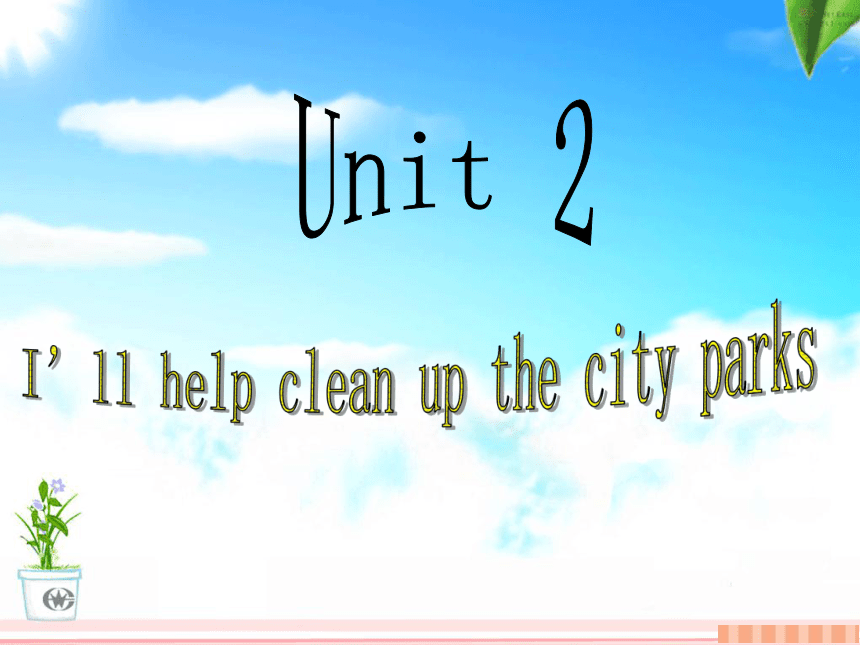
|
|
| 格式 | zip | ||
| 文件大小 | 3.9MB | ||
| 资源类型 | 教案 | ||
| 版本资源 | 人教新目标(Go for it)版 | ||
| 科目 | 英语 | ||
| 更新时间 | 2015-03-12 00:00:00 | ||
图片预览


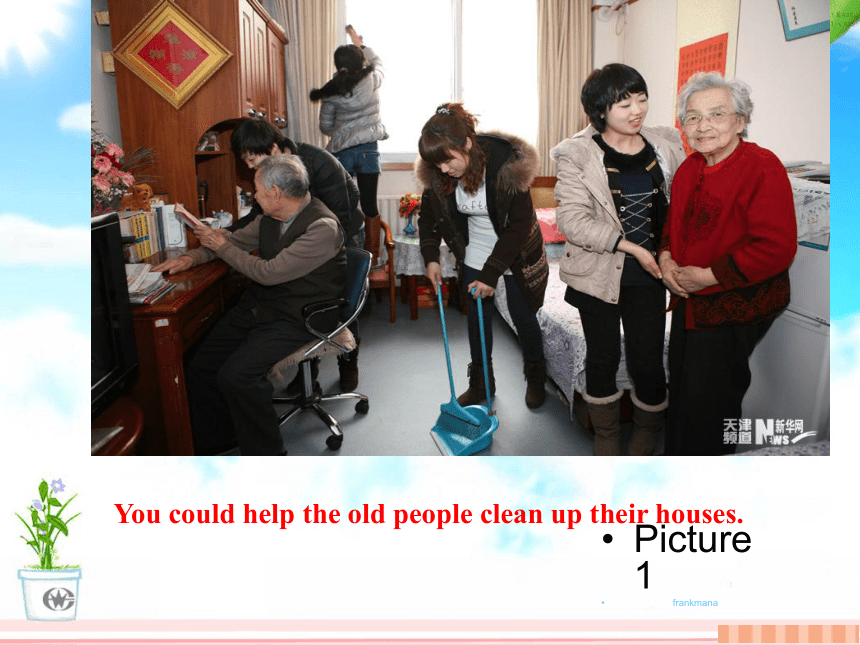
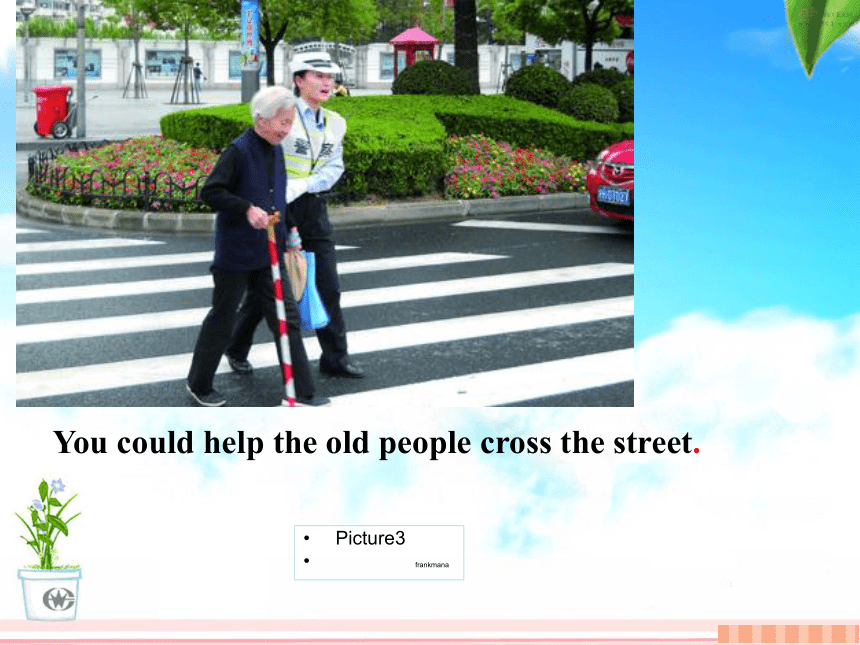
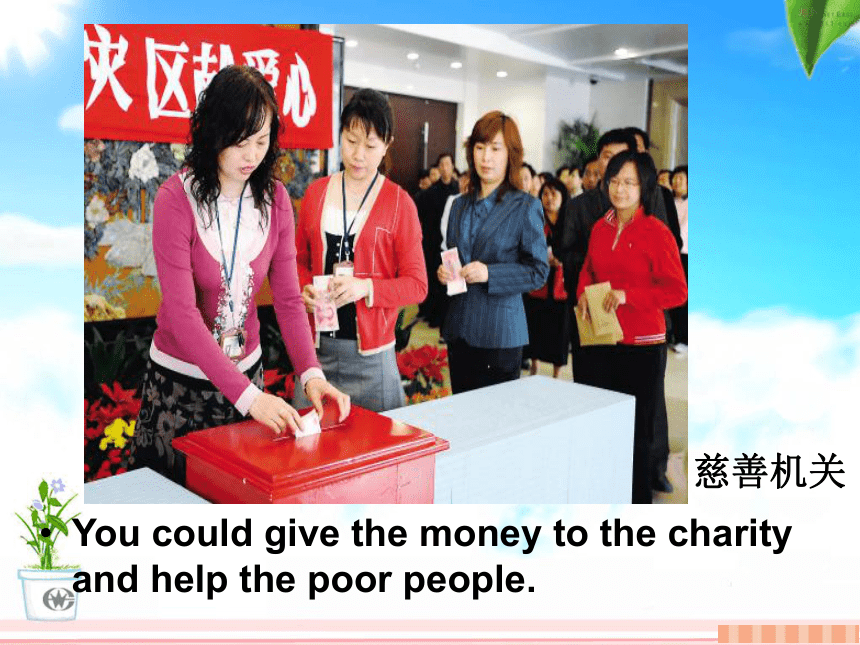
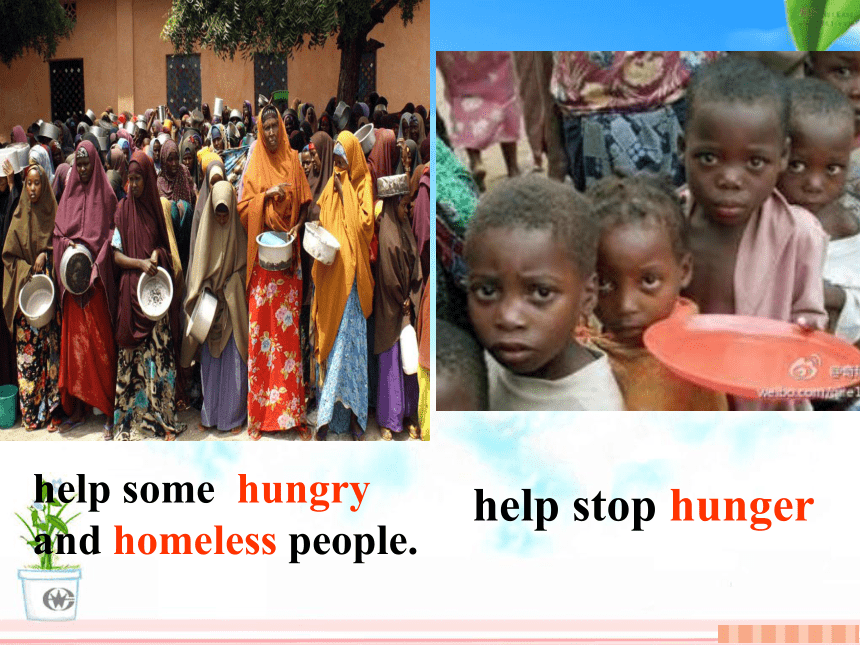
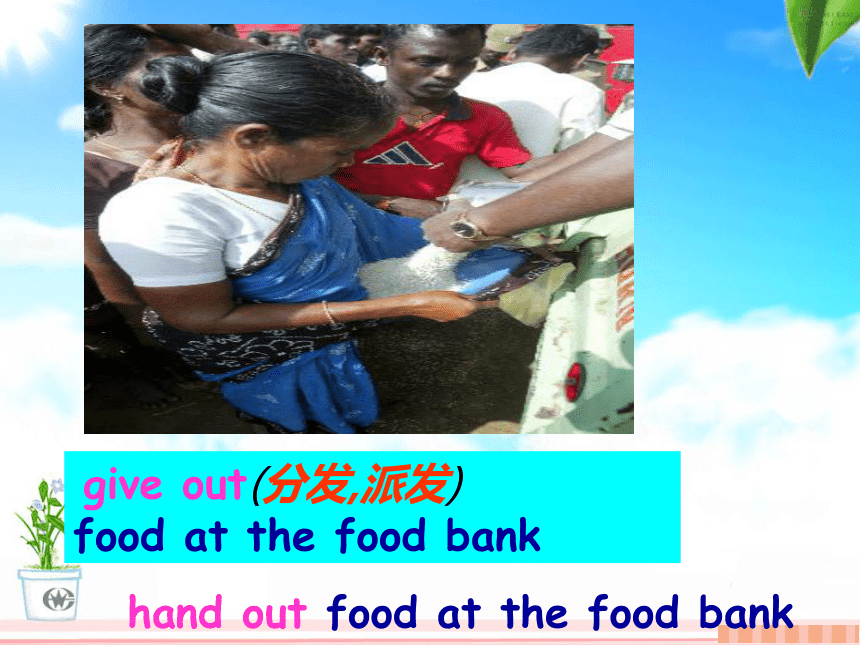
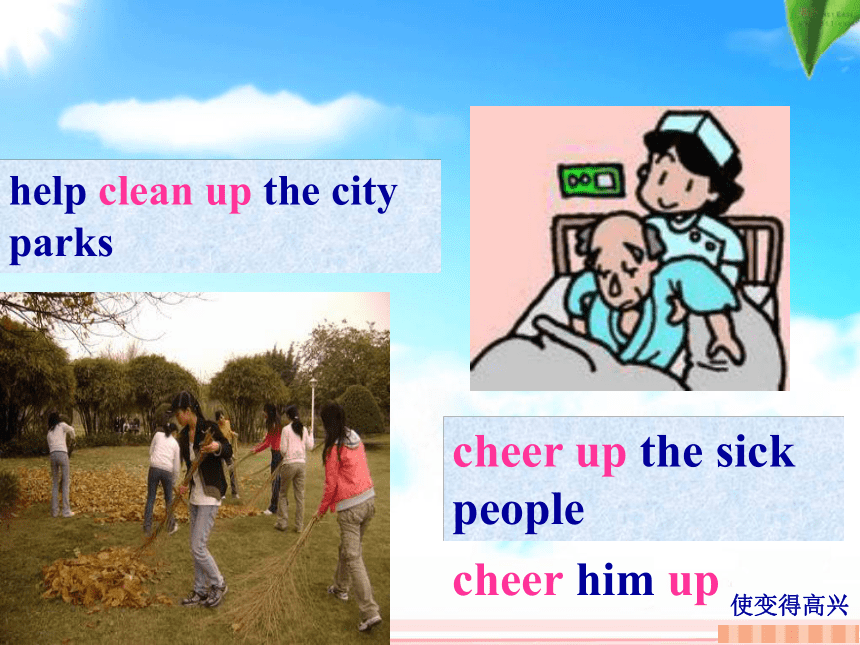


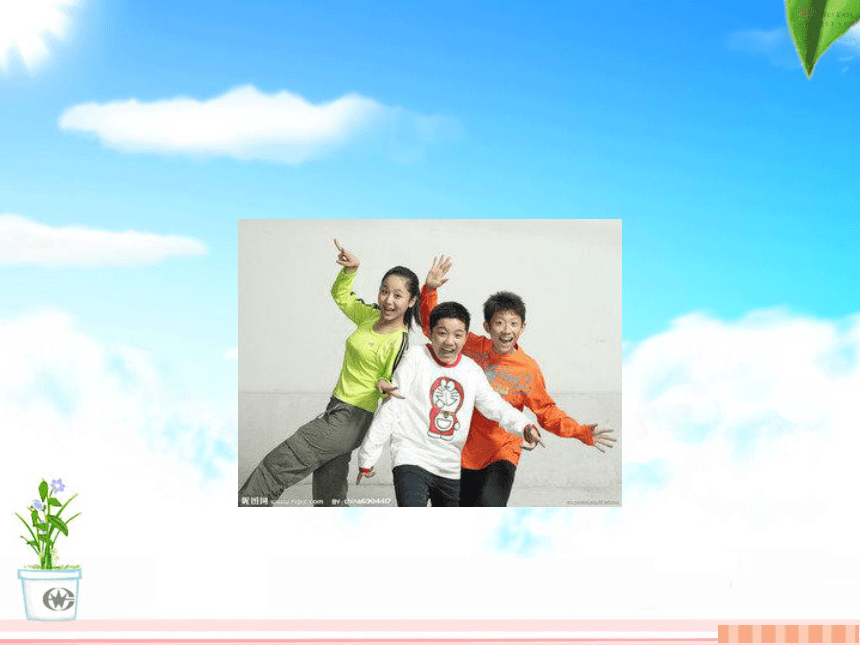
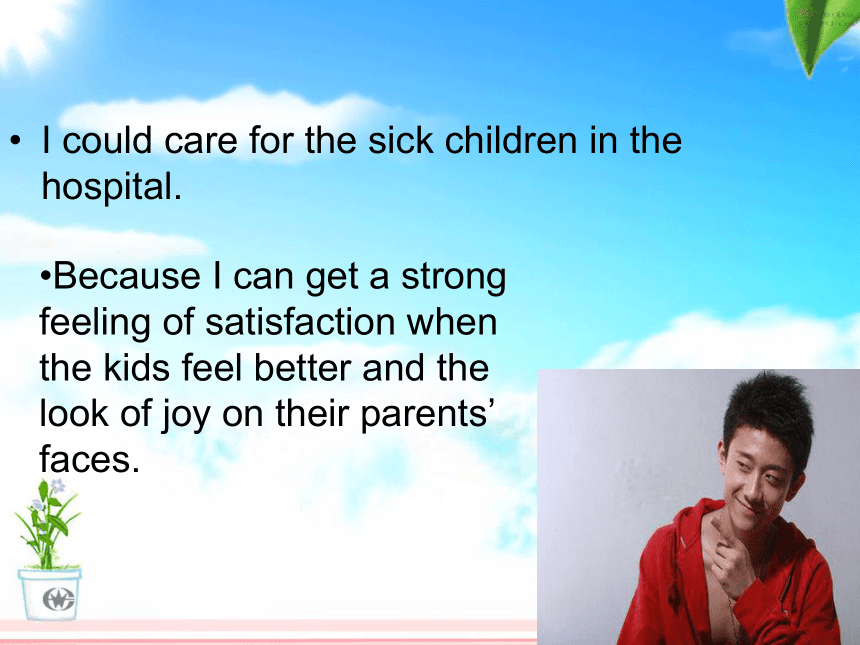
文档简介
课件92张PPT。I’ll help clean up the city parksUnit 2Tomorrow is Lei Fei Day. We should do something to commemorate him. Imagine you could help others for several hours. What could you do?纪念Picture1
frankmanaYou could help the old people clean up their houses. Picture3
frankmanaYou could help the old people cross the street. You could give the money to the charity and help the poor people. 慈善机关help stop hungerhelp some hungry and homeless people. give out(分发,派发)
food at the food bankhand out food at the food bankhelp clean up the city parkscheer up the sick peoplecheer him up使变得高兴volunteer in an after-school study program to teach kids.当志愿者If I had lots of money, I would…set up a Hope Schoolhelp poor kids建立、建造I could care for the sick children in the hospital.Because I can get a strong feeling of satisfaction when the kids feel better and the look of joy on their parents’ faces.I could read by herself at the age of four. I want to be a teacher. So I will try out for the job.I’m going on a different journey with each new book.I could help the lost dogs find their owners.What do Mario and Mary volunteer to do?Mario volunteers at an animal hospital every Saturday morning.Mary volunteers in an after-school reading
program once a work to help kids learn to read.Why do Mario and Mary volunteer to help others? 2. what do they say about volunteering? Because they want to do what they love to do.Mario thinks volunteering is hard work, but he can
get a strong feeling of satisfaction from it.
3 I get such a strong feeling of satisfaction when I see the animals get better and the look of joy on their owners’ faces.
当我看到动物们(病情)渐好,看到主人脸上的喜悦表情时,我产生出那么一种极强的满足感来.
How did you get such an idea? 产生
He got angry with me after that. 变得
4 She could read by herself at the age of four.
I could cook by独自地 myself (when I was ten) at the age of ten 在。。。岁在时候.
5 Volunteering here is a dream come true for me.
在这里当志愿者对我来说是梦想成真。
I got the latest CD player as a birthday present yesterday. It was just a dream come true!
昨天我收到了最新的CD播放器作为一份生日礼物,真是梦想成真了。
to be to learn to care to look to help to do put off call upcome up with cheer up put up hand outgive out to make to do to helpto spend to visit to move此句中get的两次用法意义各不相同。第一个get的意思是“产生;形成”,为及物动
词,常与feeling (感觉;情感),idea (想法;主意)等词搭配使用。例如:
Do you get the feeling that we’re not welcome here?你有这里不欢迎我们的感觉吗?
How did you get such an idea?
你怎么会产生这样一个想法?
第二个get是系动词,后接形容词,表示体质、情绪、天气等方面的改变,通常译作
“变得;变为”。例如:2. She could read by herself at the age of four.
她在四岁时就能够独自看书 。
此句中“by+反身代词” 表示“独自地;独立地” ,常与动词或动词短语连用,作句
子的方式状语。再如:
Children should learn to do things by themselves.
孩子们应当学习独立做事。3. Volunteering here is a dream come true for me.在这里当志愿者对我来说是梦想成真。
此句中a dream come true表示“梦想成为现实;梦想成真” ,是一种固定结构。再如:
I got the latest CD player as a birthday present yesterday. It was just a dream come true !
昨天我收到了一份生日礼物,是那种最新的C D播放机,真是梦想成真了!I ’ve always wanted to visit New York, so going there on vacation next month will be a dream come true for me.
我一直都想去纽约,所以下个月到那儿度假对我来说将是梦想成真。3 I get such a strong feeling of satisfaction when I see the animals get better and the look of joy on their owners’ faces.
当我看到动物们(病情)渐好,看到主人脸上的喜悦表情时,我产生出那么一种极强的满足感来.
How did you get such an idea? 产生
He got angry with me after that. 变得
4 She could read by herself at the age of four.
I could cook by独自地 myself (when I was ten) at the age of ten 在。。。岁在时候.
5 Volunteering here is a dream come true for me.
在这里当志愿者对我来说是梦想成真。
I got the latest CD player as a birthday present yesterday. It was just a dream come true!
昨天我收到了最新的CD播放器作为一份生日礼物,真是梦想成真了。
Section B Explanation for Section B 1.run out of = use up “用完”、“卖光”。句子的主语是人或使用的物。注意不能用于被动语态。
I am running out of my money.= My money is running out of.
We are running out of the gas. = Our car is running out of the gas.2. I take after my mother.
take after ≈look like ,be similar to
3. I fixed it up.
fix up = repair(修理);fasten(安装)
4. give away 赠送
5. call up = ring up;give sb. a ring.;phone sb.
6. hand out(散发); hand in(上缴);
hand around/round(传递)
hand on (依次传递)
7 .work out (结果、结果是)
The idea works out well.
那个注意的实施结果很好。
另外还有“解答出、计算出”的意思。
Can you work out the answer to this question?
See if you can work out this bill.PAIRWORKA:What do you do, Jimmy?
B:I fix up bikes and give
them away.1eReadingDear Miss Li,
I’d like to thank you for giving money to Animal Helpers. I’m sure you know that this group was set up to help disabled people like me. ④You helped to make it possible for me to have Lucky. Lucky makes a big difference to my life. Let me tell you my story.4. You helped to make it possible for me to have Lucky.有了你的帮助,我才有可能拥有“幸运儿” (狗名)。
此句中 make it possible for someone to do something是一种固定结构,表示 “使
得某人有可能做某事” 。在这个句型中,it仅是一个形式上的宾语,真正的宾语是to do something ,又如:2 make it possible for sb. to do sth.
“使得某人有可能……”
Your help makes it possible for him to succeed.(1)make+宾语+名词, “使……”。
We made him monitor. (2)make+宾语+形容词, “使……”
His words made me happy. (3)make+宾语+动词原形,“让……做……”
He made me work ten hours a day.又如:
Mr. Green makes it possible for us to learn English easily and in an interesting way in his class.格林先生使我们能够在他的课堂上通过有趣的方式轻松地学习英语。
Computer technology makes it possible for many people to work at home.
电脑技术使得许多人在家便可办公。 I can't use my arms or legs well, so normal things like answering the telephone, opening and closing doors, or carrying things are difficult for me. Then one day last year, a friend of mine helped me out. ⑤She talked to Animal Helpers about getting me a special trained dog. She also thought a dog might cheer me up. I love animals and I was excited about the idea of having a dog.
5. She talked to Animal Helpers about getting me a special trained dog.
她与“动物帮手” 组织联系,试图给我找一只经过特殊训练的狗。
此处Animal Helpers大写首字母,为专有名词,指“动物帮手” 这一组织。若小写,
an animal helper则可指一只给人提供某种帮助的动物。 例如:
In my life, I see different animals used as animal helpers. We have, for example, dog helpers, monkey helpers, elephant helpers and soon .
在我一生中,见到过不同的动物用作动物帮手。例如,我们有狗狗帮手、猴子帮手、大象帮手等等。After six months of training with a dog at Animal Helpers, I was able to bring him home. My dogs name is Lucky — a good name for him because I feel very lucky to have him. You see, I’m only able to have a “dog helper” because of your kindness! Lucky is very clever and understands many English words. He can understand me when I give him orders. For example, I say, “Lucky! Get my book,and he does it at once.
Lucky is a fantastic dog. I'll send you a photo of him if you like, and I could show you how he helps me. Thank you again for changing my life.
Best wishes,
Ben SmithWhat would it be like to be blind or deaf? Or imagine you can’t walk or use your hands easily. Most people would never think about this, but many people have these difficulties. 动词短语Phrasal verb1.定义: 动词之后加介词或副词构成短语,表达一种特定的含义;如果被拆开则不能表达这种特定的含义.
2.分类: 及物的短语动词必须接宾语,
不及物的短语动词则不需接宾语.
Grammar1. 及物短语动词所带宾语的位置:
名词作宾语时,对于“动词+副词”的短
语、名词既可以放在短语动词之后,也
可以放在短语动词中间. 对于 “动词 +
介词” 的短语, 名词放在介词之后.(2) 代词作宾语时,对于“动词+副词” 的短语,
代词放在短语动词的中间,对于“动词+ 介词”
的短语,代词放在介词之后.一、重点短语
1. Clean-Up Day 清洁日
2. an old people’s home 养老院
3. help out with sth. 帮助解决困难
4. used to 曾经… 过去_
5. care for 关心;照顾
6. the look of joy 快乐的表情
7. at the age of 在......岁时
8.clean up 打扫(或清除)干净
9. cheer up (使)变得更高兴;振雀
10. give out 分发;散发11. come up with 想出;提出
12. make a plan 制订计划
13. make some notices 做些公告牌
14. try out 试用;试行
15. work for 为…工作;为…. 效力
16. put up 建造;举起;张贴
17. hand out 分发;散发;发给
18. call up 打电话;召集
19. put off 推迟;延迟
20. for example 比如;例如22. take after 与......相像;像
23. give away 赠送;捐赠
24. fix up 修理;修补;解决
25. be similar to 与……相似
26. set up 建立;设立
27. disabled people 残疾人
28. make a difference 影响;有作用
29. be able to 能够
30. after-school reading program课外阅读项目二、重点句型
1. The boy could give out food at the food bank.
这个男孩可以在食品救济站分发食物。
2. Clean-Up Day is only two weeks from now.
清洁日离现在仅仅两周的时间。
3. He volunteers at an animal hospital every Saturday morning.
每周六上午,他都在一'家动物医院当志愿者。
4. Last year, she decided to try out for a volunteer after-school reading program.
去年,她决定去参加一个课外阅读项目的志愿者的选拔。5. . . . you can see in th e ir eyes that they’ re going on
a different journey w ith each new book.
……从他们的眼睛里你可以看到他们正在进行每
本不同的新书之旅。
6. I want to put off my plan to work in an animal hospital until next summer.
我想把我在动物医院工作的计划推迟到明年夏天。
7. Most people today are only worried about getting
good jobs to make lots of money.
现在的大部分人只是为找一份能挣许多钱的好工作而着急。
8. You helped to make it possible for me to have Lucky.
在你的帮助下,我才有可能拥有“幸运儿”。Nouns: money, animal, helpers, people
lucky, organization…
Pronouns: I ,you, it, my, who, that…
Verbs: like, thank, send, set (up), fill…
Adjectives: disabled, blind, deaf, normal…
Adverbs: easily, well, last year, at once…
Prepositions: for, with, of…
Conjunctions: but, and, because, or…
Exclamations: You see, Lucky!1.In what other ways do you think dogs are able to help people?(guide dog;watchdog)
2.What other animals can we train to help people?(elephants;dolphins)2eDiscuss the questions with a partner.?Working in an old people's home
?Helping kids in an after-school program
?Being a guide at a museum3aLook at these kinds of volunteer work.Can you add more?What would you like to do? Discuss it with a partner.Write a letter or e-mail to the place you want to volunteer at.Dear Sir of Madam,
___________________________________
___________________________________
___________________________________
___________________________________
___________________________________
Yours truly,
_____________3bSelf CheckFill in the blanks with the appropriate phrasal verbs or infinitivesLast week, Jimmy, the Bike Boy_________of money __________ old bikes.He was unhappy; so everyone was trying__________ him up. He_____ some signs asking for old bikes and__________ all his friends on the phone__________ them about the problem. He even__________notices at the supermarket. Then he told the teachers at school about his problem and they__________a call-in center for parents. The ideas that he__________with worked out fine. He now has 16 bikes______up and__________to children who don’t have bikes.ran outto buyto cheerput upcalled upto tellhanded outset upcame upto fixgave awayExercisesHe helps ____ the classroom.
A.cleans up B. cleaning up C. clean up
2. I took her to the concert to ____.
A. cheer up her B. cheer her up
C. cheer she up
3.The boss put off ___ the workers’ wages.
A. to give out B. give up C. giving out CBC1.The man established a factory in our village last year.
= The man ____ ____ a factory in our
village last year.
2. We need to think up some ideas .
= We need to _____ ____ ____ some ideas
3.He phoned me and asked me to go there.
= He _____ ____ ___ and asked me to go thereset up come up with called/rangme up to set up a shop aren’t supposed to hand out1. 我准备领他去看电影, 以便他会高兴起来。
I am going to _____ him _____the cinema
_____ _____ _____ _____.
2. 这些词都很重要,请把它们记下来。
These words are all very important.
______ ______ ______, please!
3. 你知道谁在校门口分发广告了吗?
Do you know who _______ _____
______________at the school gate?根据汉语完成句子。to cheer him upWrite them downtaketohanded outadvertisements4.他们的老师不但会讲英语,而且还会讲日语。
Their teacher can speak ______ ______
English ______ ______Japanese.
5.没人想买这些大衣,甚至白送也不要。
No one wants to buy these coats. You can’t
even ______ _____ _______.
6.他想尽力通过这次考试,因此他学习更加努力。
He ______ ___ ______ _____ _____, so he
works harder.not onlybut alsogive them awaytries to pass the examHands up !/ Put up your hand.put off till tomorrow 2.may和might的用法
may(might)意为“可以”,表示说话人同意、许可或请求对方许可,也可表示祝愿。may的否定式为 may not。might 是may 的过去式,有两种用法:一种表示过去式;一种表示虚拟语气,使语气更加委婉、客气,或表示可能性更小。如:
______________ I use your pen? 我可以用你的钢笔吗?
You may put on more clothes. 你可以多穿衣服。
May you be happy.祝你开心。
Might I borrow some money now?我现在可以借点钱吗?
He might be alive.他可能还活着。May 情态动词 情态动词英语语法复习系列课件中考考点
情态动词can, must, need, may等的基本句型结构及主要用法。 情态动词 考点 情态动词 情态动词表示说话人对某一动作或状态的态度,表示“可能”、“应当”、“必要”等含义,但其本身词义不完全,不能独立作谓语,必须和动词原形连用。情态动词没有人称和数的变化。其否定形式一般是在情态动词后加not (have to除外),其疑问形式是将情态动词提至主语前。情态动词数量不多,但用途广泛,主要有:can(could), may(might), must, need, shall(should), will(would)。
1.can和could的用法
can(could)表示“能力”、“许可”、“可能性”等。could 为 can 的过去式。表示请求时,could比can更婉转。如:
Can I use your bike?我可以用你的自行车吗? 情态动词 [注意] can 和could 只能用于现在时和过去时两种时态,将来时中用 be able to。另外 can't 可表示否定推测。如:
That ______ be Mr Wang. He has gone to Beijing.
A. must B. can
C. can't D. needC 情态动词 3.must的用法
must 意为“必须,应该,一定,准是”,表示说话人认为有必要做某事,命令、要求别人做某事以及对事物的推测。must 用于一般现在时和一般将来时,过去式可用 have to 的过去式代替。如:
I ________ finish my work today.我今天必须完成我的工作。
You mustn't drive after drinking.你绝不能酒后驾车。
(1)must 和 have to 的区别: must 表示说话人的主观意愿;have to 表示客观需要。如:
I must do my homework first.我必须首先做家庭作业。
It is raining hard outside; I ___________ stay at home.
外面雨下得很大,我不得不待在家里。must 情态动词 have to (2)回答must 的提问
①肯定回答:Yes,…must. 如:
—Must I go home now?
—Yes, you must.
“我必须现在回家吗?” “是的,你必须。”
②否定回答:No,…needn't./No,…don't/doesn't have to. 如:
—Must I go home now?
—No, you ________________.
“我必须现在回家吗?” “不,没必要。”
(3)must 可以表示肯定推测,意为“一定”。如:
The man must be our teacher.
那个人一定是我们的老师。needn't/don't have to 情态动词 4.need的用法
(1)need 做情态动词表示“需要,必须”。主要用于否定句和疑问句中,否定形式为needn't,表示“没有必要,不必”;need 提问时,肯定回答用must,否定回答用 needn't。如:
—Need we do some cleaning now?
“我们必须现在大扫除吗?”
—Yes, you must. “是的,你们必须。”
—No, you needn't. “不,你们不必。”
(2)need 还可当做实义动词使用,这时常用结构为 need to do sth。如:
I need to learn more. 我需要学习更多。 情态动词 5.shall和should的用法
shall 用于第一人称的句子中表示提建议或请求;
should用于各种人称的句子中强调义务或责任。如:
______________ we go out for a walk?
我们出去散步好吗?(建议)
You should study hard at school.
你们在学校应该努力学习。(劝告)
6.will和would的用法
will用于第二人称疑问句时,表示征求意见或提建议。
would 为 will 的过去式,可用于多种人称,表示意愿。如:
Will you have a little soup? 你要不要喝点汤?Shall 情态动词 情态动词 [归纳] 情态动词表推测的用法
(1)肯定句中一般用must(一定),may(可能),might / could(也许,或许),其中must表推测的语气最强,其余依次渐弱。如:
The book must be hers. Her name is on it.
He must be running.他一定是在跑步。
They may know the way to the library.他们可能知道去图书馆的路。
(2)否定句中一般用can't / couldn't(不可能)。如:
That man can't be Mr Li because he has gone to London.那个人不可能是李老师,因为他去伦敦了。
(3)疑问句中用can / could(能)。如:
—Can the red sweater be Tom's?“这件红毛衣会是吉姆的吗?”
—No, it can't. He can't stand red.“不,不可能。他不能忍受红色。”
[注意] might, could并不是may, can的过去式,而是表示语气较委婉或可能性较小。 情态动词 根据句意及汉语提示完成句子,每空词数不限
1.—Must I finish the work now?
—No, you _____________________________(不必).
2.I think you ________________________ (一定饿了). I'll cook dinner for you.
3.—Peter, is the dictionary Mary's?
—No, it ________________________(不可能是她的). Her dictionary is at home.
4.—Could I have a look at your photos?
—Yes, you _______________ (能).
5.I ____________________ (能游泳) at the age of five.考点过关needn't/don't have tomust be hungrycan't be herscancould swim 情态动词 【2013 甘肃白银】37. Finish your homework first, then you’ll _______ watch TV for an hour.
A. can B. be able to C. able D could
【答案】B 考查助动词用法。 will是助动词,其后应该用动词的原型,故选B。【2013广东梅州】35.—Amy, I hear you’ve got many foreign coins. ______ I have a look?
—Of course, I’ll fetch them for you.
A. May B. Must C. Should D. Need
【答案】A
【解析】考查情态动词的用法。句意:——艾米,我听说你有很多外国硬币。我可以看一下吗?——当然了。我拿给你看。May I…?用于向对方提出建议或请求,意为“我可以……吗?”。故选A。
【2013天津】37.— Where are you going this month?
— We______ go to Xiamen, but we're not sure.
A. needn’t B. must C. might D. mustn't
【答案】C
【解析】考查情态动词表推测。A“不必”表建议;B“一定”表猜测的可能性很大;C“可能,也许”表不是很肯定的猜测。D“不允许”表命令。句意:——这个月你们将去哪?——我们或许去厦门,但还不确定。故选C符合语境。【2013山东威海】33. -—May I go out for a while, Mom?
—No, you . You have to finish your homework first.
A. shouldn't B. needn't C. mustn't D. won't
【答案】B
【解析】考查情态动词的用法。句意:妈妈,我可以出去一会吗?不,你不能。 你必须首先完成你的作业。shouldn’t不应该;needn’t不必要;mustn’t一定不能,表示明令禁止;won’t将不能。根据答语,你必须首先完成你的作业,可知不同意出去玩。故选B。【2013福建泉州】36.— Have you decided where to go for your summer vacation?
—Not yet. We _______go to Qingdao . It's a good place for vacation.
A. may B. need C. must
【答案】 A
【解析】本题考查情态动词。句意:——你已经决定到哪里过暑假了吗?——还没有呢,我们也许去青岛。那是个度假的好地方。情态动词表示推测时,may表“可能”,must表“一定”,can’t表“不可能”。【2013浙江舟山、嘉兴】23. Drivers ________ wear seat belts while their cars are running on the road.
A. need B. can
C. must D. may
【答案】C
【解析】考查情态动词的用法。句意为“司机必须系安全带当车在路上行驶的时候。”must的意思是“必须”,符合句意。故选C。【2013 上海】40. —Must I go to medical school and be a doctor like you, dad?
—No, you _______,son. You’re free to make your own decision.
A. can’t B. mustn’t C. shouldn’t D. needn’t
【答案】 D
【解析】考查情态动词的辨析 句意:爸爸,我必须去医学院,成为像你一样的医生吗?你不必,儿子。你可以自己做决定。用must提问的句子,其否定回答用needn’t或don’t have to。【2013江苏苏州】10. If you ______ go, at least wait until the rain stops.
A. can B. may C. must D. will
【答案】C
【解析】考查情态动词。根据句意“如果你必须得走,至少要等到雨停的”,只有C符合题意。【2013广东广州】20.—Must I finish my homework now?
—No, you ______. You can go home now.
A. needn’t B. mustn’t C. shouldn’t D. can’t
【答案】A
【解析】考查情态动词。以Must I…?开头的一般疑问句,其否定回答用No, you needn’t.。故选A。【2013湖北宜昌】31. —Difficulties always go with me!
—Cheer up! If God closes a door in front of you, there ______ be a window opened for you.
A. would B. must D. could D. can
【答案】B
【解析】考查情态动词的用法。must在表示推测时,意为“一定”,表示可能性很大的推测。根据句意“——困难总是伴随我的左右。——振作起来吧!如果上帝在你面前关上一扇门的话,肯定有一扇窗户为你开着。”可以判断用must。所以选择答案B。【2013浙江丽水】22. —How many English words do you think I should know?
—As many as you ______. Then you will find reading quite easy.
A. will B. must C. can D. might
【答案】C
【解析】考查情态动词的用法。根据上句句意:你认为我应该知道多少英语单词?此处句意应该为:尽可能多的。can意为“能够”,符合句意,所以选C。【2013山东济南】40. —_________ I help you, sir?
—Yes. I want a T-shirt.
A. Can B. Should C. Must D. Would
【答案】A
【解析】考查情态动词辨析。根据答语“Yes. I want a T-shirt.”判断问句是售货员常用的问候语“Can I help you?”。所以答案选A。3. (2011· 中考)—Mr. Wang, can I finish my homework tomorrow?
—Sorry, you _______.
A. can’t B. don’t C. needn’t D. won’t
【解析】选A。can’t“不能”,don’t“不”,needn’t“不需要”,won’t为will not的缩写“将不会”。根据问句“王老师,我能明天完成作业吗?”可知回答应为“对不起,你不能。”故选A。7. (2012· 中考)—Shall we take a taxi?
—No, we _______. It’s not far from here.
can’t B. mustn’tC. shouldn’t D. needn’t
【答案】A
【解析】选D。由答语“它离这儿不远。”可知没必要乘出租车。故选D。 THANK YOU !
frankmanaYou could help the old people clean up their houses. Picture3
frankmanaYou could help the old people cross the street. You could give the money to the charity and help the poor people. 慈善机关help stop hungerhelp some hungry and homeless people. give out(分发,派发)
food at the food bankhand out food at the food bankhelp clean up the city parkscheer up the sick peoplecheer him up使变得高兴volunteer in an after-school study program to teach kids.当志愿者If I had lots of money, I would…set up a Hope Schoolhelp poor kids建立、建造I could care for the sick children in the hospital.Because I can get a strong feeling of satisfaction when the kids feel better and the look of joy on their parents’ faces.I could read by herself at the age of four. I want to be a teacher. So I will try out for the job.I’m going on a different journey with each new book.I could help the lost dogs find their owners.What do Mario and Mary volunteer to do?Mario volunteers at an animal hospital every Saturday morning.Mary volunteers in an after-school reading
program once a work to help kids learn to read.Why do Mario and Mary volunteer to help others? 2. what do they say about volunteering? Because they want to do what they love to do.Mario thinks volunteering is hard work, but he can
get a strong feeling of satisfaction from it.
3 I get such a strong feeling of satisfaction when I see the animals get better and the look of joy on their owners’ faces.
当我看到动物们(病情)渐好,看到主人脸上的喜悦表情时,我产生出那么一种极强的满足感来.
How did you get such an idea? 产生
He got angry with me after that. 变得
4 She could read by herself at the age of four.
I could cook by独自地 myself (when I was ten) at the age of ten 在。。。岁在时候.
5 Volunteering here is a dream come true for me.
在这里当志愿者对我来说是梦想成真。
I got the latest CD player as a birthday present yesterday. It was just a dream come true!
昨天我收到了最新的CD播放器作为一份生日礼物,真是梦想成真了。
to be to learn to care to look to help to do put off call upcome up with cheer up put up hand outgive out to make to do to helpto spend to visit to move此句中get的两次用法意义各不相同。第一个get的意思是“产生;形成”,为及物动
词,常与feeling (感觉;情感),idea (想法;主意)等词搭配使用。例如:
Do you get the feeling that we’re not welcome here?你有这里不欢迎我们的感觉吗?
How did you get such an idea?
你怎么会产生这样一个想法?
第二个get是系动词,后接形容词,表示体质、情绪、天气等方面的改变,通常译作
“变得;变为”。例如:2. She could read by herself at the age of four.
她在四岁时就能够独自看书 。
此句中“by+反身代词” 表示“独自地;独立地” ,常与动词或动词短语连用,作句
子的方式状语。再如:
Children should learn to do things by themselves.
孩子们应当学习独立做事。3. Volunteering here is a dream come true for me.在这里当志愿者对我来说是梦想成真。
此句中a dream come true表示“梦想成为现实;梦想成真” ,是一种固定结构。再如:
I got the latest CD player as a birthday present yesterday. It was just a dream come true !
昨天我收到了一份生日礼物,是那种最新的C D播放机,真是梦想成真了!I ’ve always wanted to visit New York, so going there on vacation next month will be a dream come true for me.
我一直都想去纽约,所以下个月到那儿度假对我来说将是梦想成真。3 I get such a strong feeling of satisfaction when I see the animals get better and the look of joy on their owners’ faces.
当我看到动物们(病情)渐好,看到主人脸上的喜悦表情时,我产生出那么一种极强的满足感来.
How did you get such an idea? 产生
He got angry with me after that. 变得
4 She could read by herself at the age of four.
I could cook by独自地 myself (when I was ten) at the age of ten 在。。。岁在时候.
5 Volunteering here is a dream come true for me.
在这里当志愿者对我来说是梦想成真。
I got the latest CD player as a birthday present yesterday. It was just a dream come true!
昨天我收到了最新的CD播放器作为一份生日礼物,真是梦想成真了。
Section B Explanation for Section B 1.run out of = use up “用完”、“卖光”。句子的主语是人或使用的物。注意不能用于被动语态。
I am running out of my money.= My money is running out of.
We are running out of the gas. = Our car is running out of the gas.2. I take after my mother.
take after ≈look like ,be similar to
3. I fixed it up.
fix up = repair(修理);fasten(安装)
4. give away 赠送
5. call up = ring up;give sb. a ring.;phone sb.
6. hand out(散发); hand in(上缴);
hand around/round(传递)
hand on (依次传递)
7 .work out (结果、结果是)
The idea works out well.
那个注意的实施结果很好。
另外还有“解答出、计算出”的意思。
Can you work out the answer to this question?
See if you can work out this bill.PAIRWORKA:What do you do, Jimmy?
B:I fix up bikes and give
them away.1eReadingDear Miss Li,
I’d like to thank you for giving money to Animal Helpers. I’m sure you know that this group was set up to help disabled people like me. ④You helped to make it possible for me to have Lucky. Lucky makes a big difference to my life. Let me tell you my story.4. You helped to make it possible for me to have Lucky.有了你的帮助,我才有可能拥有“幸运儿” (狗名)。
此句中 make it possible for someone to do something是一种固定结构,表示 “使
得某人有可能做某事” 。在这个句型中,it仅是一个形式上的宾语,真正的宾语是to do something ,又如:2 make it possible for sb. to do sth.
“使得某人有可能……”
Your help makes it possible for him to succeed.(1)make+宾语+名词, “使……”。
We made him monitor. (2)make+宾语+形容词, “使……”
His words made me happy. (3)make+宾语+动词原形,“让……做……”
He made me work ten hours a day.又如:
Mr. Green makes it possible for us to learn English easily and in an interesting way in his class.格林先生使我们能够在他的课堂上通过有趣的方式轻松地学习英语。
Computer technology makes it possible for many people to work at home.
电脑技术使得许多人在家便可办公。 I can't use my arms or legs well, so normal things like answering the telephone, opening and closing doors, or carrying things are difficult for me. Then one day last year, a friend of mine helped me out. ⑤She talked to Animal Helpers about getting me a special trained dog. She also thought a dog might cheer me up. I love animals and I was excited about the idea of having a dog.
5. She talked to Animal Helpers about getting me a special trained dog.
她与“动物帮手” 组织联系,试图给我找一只经过特殊训练的狗。
此处Animal Helpers大写首字母,为专有名词,指“动物帮手” 这一组织。若小写,
an animal helper则可指一只给人提供某种帮助的动物。 例如:
In my life, I see different animals used as animal helpers. We have, for example, dog helpers, monkey helpers, elephant helpers and soon .
在我一生中,见到过不同的动物用作动物帮手。例如,我们有狗狗帮手、猴子帮手、大象帮手等等。After six months of training with a dog at Animal Helpers, I was able to bring him home. My dogs name is Lucky — a good name for him because I feel very lucky to have him. You see, I’m only able to have a “dog helper” because of your kindness! Lucky is very clever and understands many English words. He can understand me when I give him orders. For example, I say, “Lucky! Get my book,and he does it at once.
Lucky is a fantastic dog. I'll send you a photo of him if you like, and I could show you how he helps me. Thank you again for changing my life.
Best wishes,
Ben SmithWhat would it be like to be blind or deaf? Or imagine you can’t walk or use your hands easily. Most people would never think about this, but many people have these difficulties. 动词短语Phrasal verb1.定义: 动词之后加介词或副词构成短语,表达一种特定的含义;如果被拆开则不能表达这种特定的含义.
2.分类: 及物的短语动词必须接宾语,
不及物的短语动词则不需接宾语.
Grammar1. 及物短语动词所带宾语的位置:
名词作宾语时,对于“动词+副词”的短
语、名词既可以放在短语动词之后,也
可以放在短语动词中间. 对于 “动词 +
介词” 的短语, 名词放在介词之后.(2) 代词作宾语时,对于“动词+副词” 的短语,
代词放在短语动词的中间,对于“动词+ 介词”
的短语,代词放在介词之后.一、重点短语
1. Clean-Up Day 清洁日
2. an old people’s home 养老院
3. help out with sth. 帮助解决困难
4. used to 曾经… 过去_
5. care for 关心;照顾
6. the look of joy 快乐的表情
7. at the age of 在......岁时
8.clean up 打扫(或清除)干净
9. cheer up (使)变得更高兴;振雀
10. give out 分发;散发11. come up with 想出;提出
12. make a plan 制订计划
13. make some notices 做些公告牌
14. try out 试用;试行
15. work for 为…工作;为…. 效力
16. put up 建造;举起;张贴
17. hand out 分发;散发;发给
18. call up 打电话;召集
19. put off 推迟;延迟
20. for example 比如;例如22. take after 与......相像;像
23. give away 赠送;捐赠
24. fix up 修理;修补;解决
25. be similar to 与……相似
26. set up 建立;设立
27. disabled people 残疾人
28. make a difference 影响;有作用
29. be able to 能够
30. after-school reading program课外阅读项目二、重点句型
1. The boy could give out food at the food bank.
这个男孩可以在食品救济站分发食物。
2. Clean-Up Day is only two weeks from now.
清洁日离现在仅仅两周的时间。
3. He volunteers at an animal hospital every Saturday morning.
每周六上午,他都在一'家动物医院当志愿者。
4. Last year, she decided to try out for a volunteer after-school reading program.
去年,她决定去参加一个课外阅读项目的志愿者的选拔。5. . . . you can see in th e ir eyes that they’ re going on
a different journey w ith each new book.
……从他们的眼睛里你可以看到他们正在进行每
本不同的新书之旅。
6. I want to put off my plan to work in an animal hospital until next summer.
我想把我在动物医院工作的计划推迟到明年夏天。
7. Most people today are only worried about getting
good jobs to make lots of money.
现在的大部分人只是为找一份能挣许多钱的好工作而着急。
8. You helped to make it possible for me to have Lucky.
在你的帮助下,我才有可能拥有“幸运儿”。Nouns: money, animal, helpers, people
lucky, organization…
Pronouns: I ,you, it, my, who, that…
Verbs: like, thank, send, set (up), fill…
Adjectives: disabled, blind, deaf, normal…
Adverbs: easily, well, last year, at once…
Prepositions: for, with, of…
Conjunctions: but, and, because, or…
Exclamations: You see, Lucky!1.In what other ways do you think dogs are able to help people?(guide dog;watchdog)
2.What other animals can we train to help people?(elephants;dolphins)2eDiscuss the questions with a partner.?Working in an old people's home
?Helping kids in an after-school program
?Being a guide at a museum3aLook at these kinds of volunteer work.Can you add more?What would you like to do? Discuss it with a partner.Write a letter or e-mail to the place you want to volunteer at.Dear Sir of Madam,
___________________________________
___________________________________
___________________________________
___________________________________
___________________________________
Yours truly,
_____________3bSelf CheckFill in the blanks with the appropriate phrasal verbs or infinitivesLast week, Jimmy, the Bike Boy_________of money __________ old bikes.He was unhappy; so everyone was trying__________ him up. He_____ some signs asking for old bikes and__________ all his friends on the phone__________ them about the problem. He even__________notices at the supermarket. Then he told the teachers at school about his problem and they__________a call-in center for parents. The ideas that he__________with worked out fine. He now has 16 bikes______up and__________to children who don’t have bikes.ran outto buyto cheerput upcalled upto tellhanded outset upcame upto fixgave awayExercisesHe helps ____ the classroom.
A.cleans up B. cleaning up C. clean up
2. I took her to the concert to ____.
A. cheer up her B. cheer her up
C. cheer she up
3.The boss put off ___ the workers’ wages.
A. to give out B. give up C. giving out CBC1.The man established a factory in our village last year.
= The man ____ ____ a factory in our
village last year.
2. We need to think up some ideas .
= We need to _____ ____ ____ some ideas
3.He phoned me and asked me to go there.
= He _____ ____ ___ and asked me to go thereset up come up with called/rangme up to set up a shop aren’t supposed to hand out1. 我准备领他去看电影, 以便他会高兴起来。
I am going to _____ him _____the cinema
_____ _____ _____ _____.
2. 这些词都很重要,请把它们记下来。
These words are all very important.
______ ______ ______, please!
3. 你知道谁在校门口分发广告了吗?
Do you know who _______ _____
______________at the school gate?根据汉语完成句子。to cheer him upWrite them downtaketohanded outadvertisements4.他们的老师不但会讲英语,而且还会讲日语。
Their teacher can speak ______ ______
English ______ ______Japanese.
5.没人想买这些大衣,甚至白送也不要。
No one wants to buy these coats. You can’t
even ______ _____ _______.
6.他想尽力通过这次考试,因此他学习更加努力。
He ______ ___ ______ _____ _____, so he
works harder.not onlybut alsogive them awaytries to pass the examHands up !/ Put up your hand.put off till tomorrow 2.may和might的用法
may(might)意为“可以”,表示说话人同意、许可或请求对方许可,也可表示祝愿。may的否定式为 may not。might 是may 的过去式,有两种用法:一种表示过去式;一种表示虚拟语气,使语气更加委婉、客气,或表示可能性更小。如:
______________ I use your pen? 我可以用你的钢笔吗?
You may put on more clothes. 你可以多穿衣服。
May you be happy.祝你开心。
Might I borrow some money now?我现在可以借点钱吗?
He might be alive.他可能还活着。May 情态动词 情态动词英语语法复习系列课件中考考点
情态动词can, must, need, may等的基本句型结构及主要用法。 情态动词 考点 情态动词 情态动词表示说话人对某一动作或状态的态度,表示“可能”、“应当”、“必要”等含义,但其本身词义不完全,不能独立作谓语,必须和动词原形连用。情态动词没有人称和数的变化。其否定形式一般是在情态动词后加not (have to除外),其疑问形式是将情态动词提至主语前。情态动词数量不多,但用途广泛,主要有:can(could), may(might), must, need, shall(should), will(would)。
1.can和could的用法
can(could)表示“能力”、“许可”、“可能性”等。could 为 can 的过去式。表示请求时,could比can更婉转。如:
Can I use your bike?我可以用你的自行车吗? 情态动词 [注意] can 和could 只能用于现在时和过去时两种时态,将来时中用 be able to。另外 can't 可表示否定推测。如:
That ______ be Mr Wang. He has gone to Beijing.
A. must B. can
C. can't D. needC 情态动词 3.must的用法
must 意为“必须,应该,一定,准是”,表示说话人认为有必要做某事,命令、要求别人做某事以及对事物的推测。must 用于一般现在时和一般将来时,过去式可用 have to 的过去式代替。如:
I ________ finish my work today.我今天必须完成我的工作。
You mustn't drive after drinking.你绝不能酒后驾车。
(1)must 和 have to 的区别: must 表示说话人的主观意愿;have to 表示客观需要。如:
I must do my homework first.我必须首先做家庭作业。
It is raining hard outside; I ___________ stay at home.
外面雨下得很大,我不得不待在家里。must 情态动词 have to (2)回答must 的提问
①肯定回答:Yes,…must. 如:
—Must I go home now?
—Yes, you must.
“我必须现在回家吗?” “是的,你必须。”
②否定回答:No,…needn't./No,…don't/doesn't have to. 如:
—Must I go home now?
—No, you ________________.
“我必须现在回家吗?” “不,没必要。”
(3)must 可以表示肯定推测,意为“一定”。如:
The man must be our teacher.
那个人一定是我们的老师。needn't/don't have to 情态动词 4.need的用法
(1)need 做情态动词表示“需要,必须”。主要用于否定句和疑问句中,否定形式为needn't,表示“没有必要,不必”;need 提问时,肯定回答用must,否定回答用 needn't。如:
—Need we do some cleaning now?
“我们必须现在大扫除吗?”
—Yes, you must. “是的,你们必须。”
—No, you needn't. “不,你们不必。”
(2)need 还可当做实义动词使用,这时常用结构为 need to do sth。如:
I need to learn more. 我需要学习更多。 情态动词 5.shall和should的用法
shall 用于第一人称的句子中表示提建议或请求;
should用于各种人称的句子中强调义务或责任。如:
______________ we go out for a walk?
我们出去散步好吗?(建议)
You should study hard at school.
你们在学校应该努力学习。(劝告)
6.will和would的用法
will用于第二人称疑问句时,表示征求意见或提建议。
would 为 will 的过去式,可用于多种人称,表示意愿。如:
Will you have a little soup? 你要不要喝点汤?Shall 情态动词 情态动词 [归纳] 情态动词表推测的用法
(1)肯定句中一般用must(一定),may(可能),might / could(也许,或许),其中must表推测的语气最强,其余依次渐弱。如:
The book must be hers. Her name is on it.
He must be running.他一定是在跑步。
They may know the way to the library.他们可能知道去图书馆的路。
(2)否定句中一般用can't / couldn't(不可能)。如:
That man can't be Mr Li because he has gone to London.那个人不可能是李老师,因为他去伦敦了。
(3)疑问句中用can / could(能)。如:
—Can the red sweater be Tom's?“这件红毛衣会是吉姆的吗?”
—No, it can't. He can't stand red.“不,不可能。他不能忍受红色。”
[注意] might, could并不是may, can的过去式,而是表示语气较委婉或可能性较小。 情态动词 根据句意及汉语提示完成句子,每空词数不限
1.—Must I finish the work now?
—No, you _____________________________(不必).
2.I think you ________________________ (一定饿了). I'll cook dinner for you.
3.—Peter, is the dictionary Mary's?
—No, it ________________________(不可能是她的). Her dictionary is at home.
4.—Could I have a look at your photos?
—Yes, you _______________ (能).
5.I ____________________ (能游泳) at the age of five.考点过关needn't/don't have tomust be hungrycan't be herscancould swim 情态动词 【2013 甘肃白银】37. Finish your homework first, then you’ll _______ watch TV for an hour.
A. can B. be able to C. able D could
【答案】B 考查助动词用法。 will是助动词,其后应该用动词的原型,故选B。【2013广东梅州】35.—Amy, I hear you’ve got many foreign coins. ______ I have a look?
—Of course, I’ll fetch them for you.
A. May B. Must C. Should D. Need
【答案】A
【解析】考查情态动词的用法。句意:——艾米,我听说你有很多外国硬币。我可以看一下吗?——当然了。我拿给你看。May I…?用于向对方提出建议或请求,意为“我可以……吗?”。故选A。
【2013天津】37.— Where are you going this month?
— We______ go to Xiamen, but we're not sure.
A. needn’t B. must C. might D. mustn't
【答案】C
【解析】考查情态动词表推测。A“不必”表建议;B“一定”表猜测的可能性很大;C“可能,也许”表不是很肯定的猜测。D“不允许”表命令。句意:——这个月你们将去哪?——我们或许去厦门,但还不确定。故选C符合语境。【2013山东威海】33. -—May I go out for a while, Mom?
—No, you . You have to finish your homework first.
A. shouldn't B. needn't C. mustn't D. won't
【答案】B
【解析】考查情态动词的用法。句意:妈妈,我可以出去一会吗?不,你不能。 你必须首先完成你的作业。shouldn’t不应该;needn’t不必要;mustn’t一定不能,表示明令禁止;won’t将不能。根据答语,你必须首先完成你的作业,可知不同意出去玩。故选B。【2013福建泉州】36.— Have you decided where to go for your summer vacation?
—Not yet. We _______go to Qingdao . It's a good place for vacation.
A. may B. need C. must
【答案】 A
【解析】本题考查情态动词。句意:——你已经决定到哪里过暑假了吗?——还没有呢,我们也许去青岛。那是个度假的好地方。情态动词表示推测时,may表“可能”,must表“一定”,can’t表“不可能”。【2013浙江舟山、嘉兴】23. Drivers ________ wear seat belts while their cars are running on the road.
A. need B. can
C. must D. may
【答案】C
【解析】考查情态动词的用法。句意为“司机必须系安全带当车在路上行驶的时候。”must的意思是“必须”,符合句意。故选C。【2013 上海】40. —Must I go to medical school and be a doctor like you, dad?
—No, you _______,son. You’re free to make your own decision.
A. can’t B. mustn’t C. shouldn’t D. needn’t
【答案】 D
【解析】考查情态动词的辨析 句意:爸爸,我必须去医学院,成为像你一样的医生吗?你不必,儿子。你可以自己做决定。用must提问的句子,其否定回答用needn’t或don’t have to。【2013江苏苏州】10. If you ______ go, at least wait until the rain stops.
A. can B. may C. must D. will
【答案】C
【解析】考查情态动词。根据句意“如果你必须得走,至少要等到雨停的”,只有C符合题意。【2013广东广州】20.—Must I finish my homework now?
—No, you ______. You can go home now.
A. needn’t B. mustn’t C. shouldn’t D. can’t
【答案】A
【解析】考查情态动词。以Must I…?开头的一般疑问句,其否定回答用No, you needn’t.。故选A。【2013湖北宜昌】31. —Difficulties always go with me!
—Cheer up! If God closes a door in front of you, there ______ be a window opened for you.
A. would B. must D. could D. can
【答案】B
【解析】考查情态动词的用法。must在表示推测时,意为“一定”,表示可能性很大的推测。根据句意“——困难总是伴随我的左右。——振作起来吧!如果上帝在你面前关上一扇门的话,肯定有一扇窗户为你开着。”可以判断用must。所以选择答案B。【2013浙江丽水】22. —How many English words do you think I should know?
—As many as you ______. Then you will find reading quite easy.
A. will B. must C. can D. might
【答案】C
【解析】考查情态动词的用法。根据上句句意:你认为我应该知道多少英语单词?此处句意应该为:尽可能多的。can意为“能够”,符合句意,所以选C。【2013山东济南】40. —_________ I help you, sir?
—Yes. I want a T-shirt.
A. Can B. Should C. Must D. Would
【答案】A
【解析】考查情态动词辨析。根据答语“Yes. I want a T-shirt.”判断问句是售货员常用的问候语“Can I help you?”。所以答案选A。3. (2011· 中考)—Mr. Wang, can I finish my homework tomorrow?
—Sorry, you _______.
A. can’t B. don’t C. needn’t D. won’t
【解析】选A。can’t“不能”,don’t“不”,needn’t“不需要”,won’t为will not的缩写“将不会”。根据问句“王老师,我能明天完成作业吗?”可知回答应为“对不起,你不能。”故选A。7. (2012· 中考)—Shall we take a taxi?
—No, we _______. It’s not far from here.
can’t B. mustn’tC. shouldn’t D. needn’t
【答案】A
【解析】选D。由答语“它离这儿不远。”可知没必要乘出租车。故选D。 THANK YOU !
同课章节目录
- Unit 1 What's the matter?
- Section A
- Section B
- Unit 2 I'll help to clean up the city parks.
- Section A
- Section B
- Unit 3 Could you please clean your room?
- Section A
- Section B
- Unit 4 Why don't you talk to your parents?
- Section A
- Section B
- Unit 5 What were you doing when the rainstorm came
- Section A
- Section B
- Review of Units 1-5
- Unit 6 An old man tried to move the mountains.
- Section A
- Section B
- Unit 7 What's the highest mountain in the world?
- Section A
- Section B
- Unit 8 Have you read Treasure Island yet?
- Section A
- Section B
- Unit 9 Have you ever been to a museum?
- Section A
- Section B
- Unit 10 I've had this bike for three years.
- Section A
- Section B
